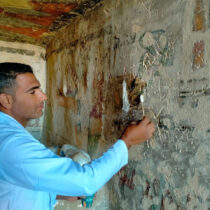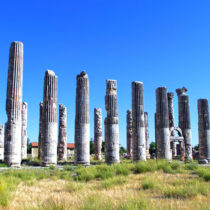A call for papers has been issued for the panel: ‘Theoretical Approaches to Ancient Greek Religion’. The panel will take place as part of the 15th Celtic Classics Conference to be held 9th–12th July 2024 in Cardiff/yng Nghaerdydd.
In line with the escalating application of theoretical models drawn from the Cognitive Science of Religion, Material Study of Religion, and Embodied Religion in the examination of ancient religious practice, this panel will explore innovative reconsiderations of established evidence and interpretation. Simultaneously, the panel seeks to present a critique of polis-centric perspectives and literary-based studies that have previously dominated the examination of ancient Greek religion. The focus of the panel rests on a fundamental revaluation of ancient Greek religious practice, with a goal of generating unique insight on the interplay between material culture, societal dynamics, and the level of contingent, individual, experience and belief. Moreover, this panel aims not to consider ancient Greek religion from the perspective of Athens alone, but rather seeks to incorporate various contexts into its inter-disciplinary approach.
From state-wide festivals to local cult, a diverse array of religious practices from across the Greek world, and ranging from the Archaic period to Late Antiquity, will serve as the thematic core of the panel’s discussions. Contributors are invited to address three key themes:
1. Archaeological Insights into Religious Landscapes: Through analysis of archaeological remains—ranging from architectural structures to intricate artefacts— the panellists are invited to unveil how the material culture of ancient Greece was both shaped by and reflective of the belief systems and religious practices of its societies. By systematically interpreting the physical traces and spatial environments of ritual practice, a comprehensive reconstruction of the religious landscape will potentially emerge, offering deeper insights into its intricate ties with the wider social fabric.
2. Sensory and Material Dimensions: Our proposed integration of sensory- and material-based theoretical approaches seeks to expand the horizons of ancient Mediterranean studies. By incorporating sensory perceptions, embodied experiences, and the materiality of religious practices into the interpretation of literary sources, a more comprehensive and nuanced understanding of ancient Greek religion will potentially be achieved. This methodological synthesis enables us to grasp the holistic nature of religious experiences in ancient Greece while also commenting on its formative properties.
3. Interplay of Personal Beliefs and Polis Religion: Delving into the intersection of personal beliefs and the polis-centred religious framework, the panellists will aim to illuminate the dynamic relationship between individual religious experiences and the overarching socio-political structure of ancient Greece. This exploration has the potential to provide fresh insights into how personal convictions contributed to the rich tapestry of the ancient Greek religious landscape. Moreover, in adopting a broadly post-structuralist avenue of investigation, the examination of personal belief will aid in moving the interpretation of ancient Greek religion away from entirely symbolist readings.
The panel aims to rejuvenate the study of Greek religion by integrating cutting edge methodologies and perspectives, ultimately shedding new light on the complex interplay between material culture, individual belief and experience, and societal frameworks. The panel will bring together scholars at a range of career stages, from PhD students to established scholars, representing the scope and applicability of these approaches on the study of Greek religion. Confirmed speakers are Susan Deacy, Ellie Mackin Roberts, and Ben Cassell, and the panel is affiliated with the with the NPAGR Network run by Ellie Mackin Roberts.
We are inviting talks based on the three core themes, while likewise appreciating that many papers will overlap and incorporate aspects of all three. We are seeking presentations of 40 minutes in length, however we are also happy to consider a number of 20 minute papers. When applying, please indicate the length of your presentation. To be considered for this panel, please send a 300 word abstract along with a short academic bio to [email protected].
The deadline for the receipt of all abstracts is the 11th of February 2024. If you have any questions relating to this panel, please email at the above addresses.





